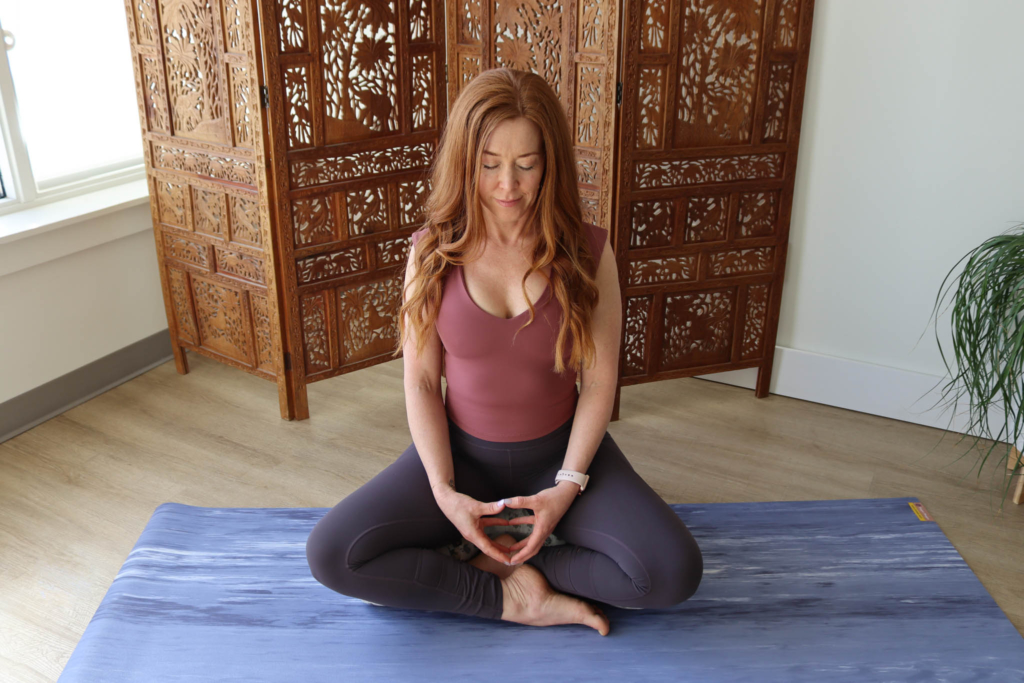
[ad_1]
This entry was posted on Apr 11, 2024 by Charlotte Bell.

For the primary time since final fall, I’m sitting subsequent to an open window as I write. The spring air, with its occasional hints of blooming bulbs and timber, is so refreshing. Whereas pranayama (yogic respiratory observe) is suitable throughout all seasons, the clear spring air appears to ask taking a pleasant deep breath. There are a lot of pranayama practices that incorporate mudras—hand gestures meant to facilitate the motion of prana (the animating pressure in our our bodies and minds). Specifically, I take pleasure in training a easy pranayama mudra known as Hasta Mudra.
I don’t declare to be an skilled available mudras. However I do acknowledge the ability of the few that I’ve practiced usually. I’ve been amazed on the distinction delicate adjustments in hand place could make. Hasta Mudra, particularly, has been a favourite amongst my yoga college students. It reveals how seemingly minor adjustments in contact can result in adjustments in respiratory that just about anybody can simply really feel. The hand place is sort of easy. Solely the diploma to which your fingers contact shifts. Hasta Mudra means that you can focus in on completely different components of the physique’s “respiratory areas.” I discovered this respiratory mudra from Jenny Otto of Physique Stability Yoga Remedy.
First Issues First: Wholesome Respiration
Generally, I’ve prevented writing about pranayama observe just because it’s finest to be taught immediately from an skilled instructor. Particularly within the case of the extra sophisticated or intense practices, it’s doable to overstimulate the nervous system. This could set off bodily, psychological and emotional imbalances. So cautious, knowledgeable instruction is crucial.
The respiratory practices I really feel comfy sharing veer towards wholesome pure respiratory. This implies gradual, deep, relaxed stomach respiratory. You breathe deeply, however by no means to the purpose of pressure. As you inhale, the stomach ought to broaden; as you exhale, it ought to contract. Nothing fancy right here, simply relaxed, nourishing respiratory. Keep relaxed, deep respiratory as you progress via the assorted levels of Hasta Mudra.
The right way to Observe Hasta Mudra
- Sit in a snug place on a Meditation Cushion or a folded Yoga Blanket. If sitting on the ground shouldn’t be comfy for you, be happy to take a seat on a chair as a substitute. What’s necessary is that your torso is upright and your pure spinal curves are aligned.
- Settle into your hips and legs and tune into your respiratory. As you inhale, enable your stomach to broaden. As you exhale, enable it to contract. Breathe deeply, however in a relaxed method, so there’s no pressure.
- Place your fingertips and thumb ideas collectively. Stability the contact between your fingertips in order that it’s each agency and receptive.
- Now, persevering with with deep, relaxed respiratory, press the little fingertips and ring fingertips collectively somewhat extra firmly than the others. The place do you’re feeling the “middle” of your breath taking place? In different phrases, should you think about your respiratory area to be your whole torso, the place does the breath really feel most distinguished? Take about 5 to 10 breaths.
- Now chill out the contact between your ring and pinky fingertips and press your center fingertips collectively extra firmly than the opposite fingers. Tune into your torso, and spot the place the middle of your breath is now. Has it modified? If it’s not clear, return to urgent your ring and pinky fingertips collectively extra firmly and spot if the middle of your breath shifts. Then take 5 to 10 breaths together with your center fingers pressed a bit extra firmly than the others.
- Let go of urgent your center fingertips extra firmly than the others. Now press your thumb ideas and index fingertips extra firmly. The place is the middle of your breath now? Once more, be happy to modify again to the center fingers or the ring and pinky fingers for a breath or two for distinction. Then return to urgent the thumbs and index fingers a bit extra firmly. Take 5 to 10 breaths on this place.
- Now press the fingertips collectively evenly. Take 5 to 10 deep breaths, noticing how your breath feels now.
Exploring Hasta Mudra
These variations of Hasta Mudra assist you to entry completely different areas of your respiratory area. Most individuals really feel the middle of the breath within the decrease stomach within the first (ring and pinky finger) variation, the center within the second (center finger) variation, and the chest within the third (thumb and index finger) variation. The fourth variation, with the fingers urgent collectively evenly, opens up the whole respiratory area. Nonetheless, it’s doable you could expertise this train otherwise. If that’s the case, belief your individual expertise. Your individual expertise is your most dependable information.
If you happen to take pleasure in Hasta Mudra, play with subdividing your respiratory area even additional. Strive urgent the little fingers, ring fingers, center fingers, index fingers and thumbs collectively individually. Discover if that provides you entry to smaller respiratory area areas.
About Charlotte Bell
Charlotte Bell found yoga in 1982 and commenced instructing in 1986. Charlotte is the creator of Conscious Yoga, Conscious Life: A Information for On a regular basis Observe and Yoga for Meditators, each revealed by Rodmell Press. Her third ebook is titled Hip-Wholesome Asana: The Yoga Practitioner’s Information to Defending the Hips and Avoiding SI Joint Ache (Shambhala Publications). She writes a month-to-month column for CATALYST Journal and serves as editor for Yoga U On-line. Charlotte is a founding board member for GreenTREE Yoga, a non-profit that brings yoga to underserved populations. A lifelong musician, Charlotte performs oboe and English horn within the Salt Lake Symphony and folks sextet Purple Rock Rondo, whose DVD gained two Emmy awards in 2010.
[ad_2]